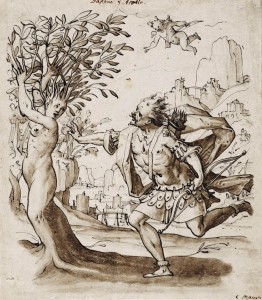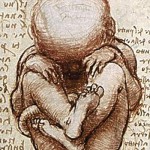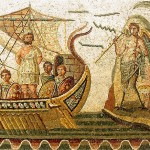Any casual student of mythology should be familiar with the customs of the gods when they mingle with humankind. The entry of the divine into human life is associated inevitably with change, often cataclysm, sometimes beneficence. The gods take interest in superlative humans and become their patrons and guides; they involve themselves in the epic struggles of politics and war; they are responsible for founding events and apocalyptic events. Sometimes they bring knowledge, sometimes punishment. In the relation between a human and a patron deity, there is sometimes even a special affection, a personal concern, as is displayed so charmingly in Sappho’s “Hymn to Aphrodite”:
“…Then thou, O blessed goddess,
All in smiling wreathed thy face immortal,
Bade me tell thee the cause of all my suffering,
Why now I called thee…”
But the gods are, for the most part, uninterested in the affairs of the common folk. The epic and the tragic are the terrains on which they interact with men and women, which means that, unless one already has assumed an epic posture, the entry of a god into your ordinary everyday life is likely to initiate tragedy. “As flies to wanton boys” as Lear says: human beings are an amusing reality TV show for the immortal ones, and while they may become emotionally invested in human sorrows, in the end they always can withdraw.
The peril of having to do with the gods is greatest for women, especially young women. Those most vulnerable in society are also most vulnerable to the desires of the gods, and there is no recourse against them. If Apollo wants to rape you he will, and the most you can hope for is to be turned into a tree or a brook to escape him. If Odin is after you, he will not take “no” for an answer. Even Krishna might pull off your clothes while you are sleeping. For a woman, the entry of a god into your life is an invasion of the most violent sort, the sort that shatters and burns, as Semele was burned, swallowed up and made nothing in the heat of male desire divinized.
There is a definite space for the erotic in poetic and mystical language about the relation between the human and divine, but I am always wary when this eroticism turns towards rapine metaphors, because that is not how our God works in our stories. I have touched elsewhere on the significance of the fact that God sends his messenger to ask the consent of Mary, and does not simply descend upon her, as Zeus did, in the form of a swan, upon the helpless Leda. The entry of God into human civilization comes with a respect for the integrity and dignity of women, even if those who claim to speak for God do not always defend this dignity.
Now, similarly, we see the resurrected Christ make his appearance first to a woman, Mary Magdalene, and how different it is from the encounters of women with gods in other stories:
“But Mary stood weeping outside the tomb, and as she wept she stooped to look into the tomb. And she saw two angels in white, sitting where the body of Jesus had lain, one at the head and one at the feet. They said to her, “Woman, why are you weeping?” She said to them, “They have taken away my Lord, and I do not know where they have laid him.” Having said this, she turned around and saw Jesus standing, but she did not know that it was Jesus. Jesus said to her, “Woman, why are you weeping? Whom are you seeking?” Supposing him to be the gardener, she said to him, “Sir, if you have carried him away, tell me where you have laid him, and I will take him away.” Jesus said to her,“Mary.” She turned and said to him in Aramaic,“Rabboni!” (which means Teacher). Jesus said to her, “Do not cling to me, for I have not yet ascended to the Father; but go to my brothers and say to them, ‘I am ascending to my Father and your Father, to my God and your God.’ ” Mary Magdalene went and announced to the disciples, “I have seen the Lord”—and that he had said these things to her.
Jesus here speaks to Mary Magdalene with affection and concern for her sorrow, speaking her name and acknowledging her dignity. He entrusts her to be the first to spread the good news of the resurrection. To read this passage as a woman is to experience a great astonishment and gratitude, because it gives assurance that in a world which so often subjugates us, silences us, or reduces us to sexual objects, we have the most powerful ally imaginable, greater than which none can be conceived, a God who has entered into our lives not to use and discard us, but to elevate and comfort us, to protect us, to give us the words to spread the gospel.
image: Apollo and Daphne, c. 1580, Christoph Murer. Currently located in Crocker Art Museum. This image is public domain in the US. image credit: https://commons.wikimedia.org/wiki/File:Christoph_Murer_-_Apollo_and_Daphne_-_WGA16344.jpg

















